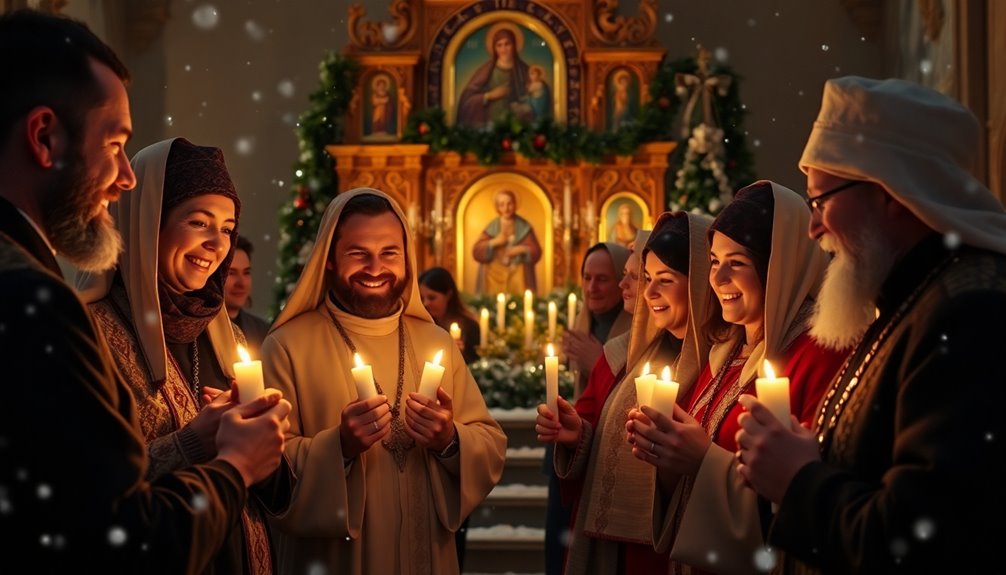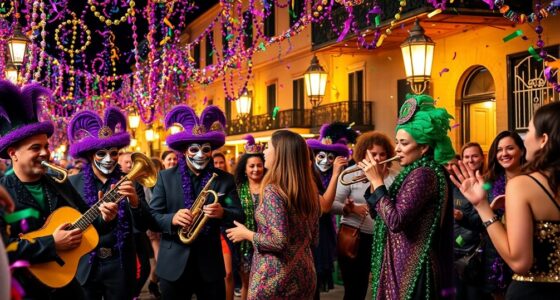Yes, Orthodox Christians do say "Merry Christmas," but their main greeting is "Christ is Born!" followed by "Glorify Him!" This reflects their unique traditions, as they celebrate Christmas on January 7 instead of December 25. While "Merry Christmas" is common, many also use "Happy Holidays" to be inclusive. Understanding the context behind these greetings is important, as regional variations may exist. Culturally sensitive greetings foster goodwill and respect during the holiday season. If you're curious about more nuances in holiday greetings, you might want to explore the rich traditions surrounding these celebrations further.
Key Takeaways
- Orthodox Christians primarily celebrate Christmas on January 7, leading to distinct holiday greetings from those who celebrate on December 25.
- The traditional Orthodox greeting is "Christ is Born!" followed by "Glorify Him!" emphasizing the religious significance of the holiday.
- While "Merry Christmas" is used, many Orthodox Christians prefer culturally sensitive greetings like "Happy Holidays" to encompass diverse beliefs.
- Unique regional expressions of holiday greetings reflect local customs and traditions within the Orthodox community.
- Awareness of the recipient's background is crucial for choosing appropriate greetings during the festive season, promoting respect and understanding.
Orthodox Christmas Celebrations
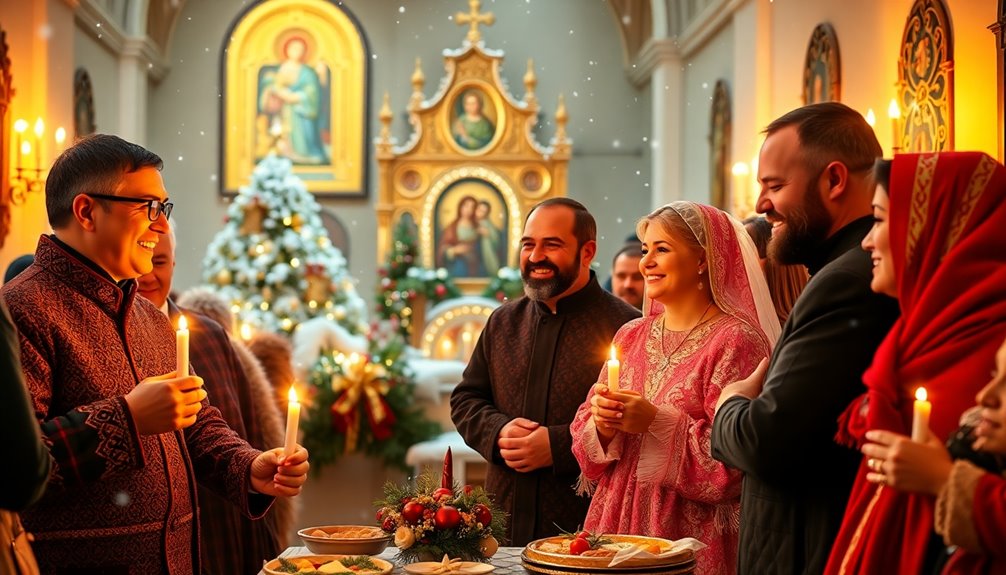
While many people celebrate Christmas on December 25, Orthodox Christians observe the holiday on January 7, following the Julian calendar.
On Christmas Eve, families gather for a special twelve-dish meal, which symbolizes the holiday's cultural significance. You might encounter the Didukh, a sheaf of wheat placed in homes to honor ancestors and represent a bountiful harvest.
Gift-giving happens after the festive dinner, encouraging a sense of community spirit and warmth. Unique customs, like burning the badnjak log in Serbia and Montenegro, add local flavor to the celebrations.
Throughout these traditions, the essence of family gatherings shines, as everyone comes together to share holiday greetings and the joy of the season, making it a truly memorable occasion.
Common Holiday Greetings
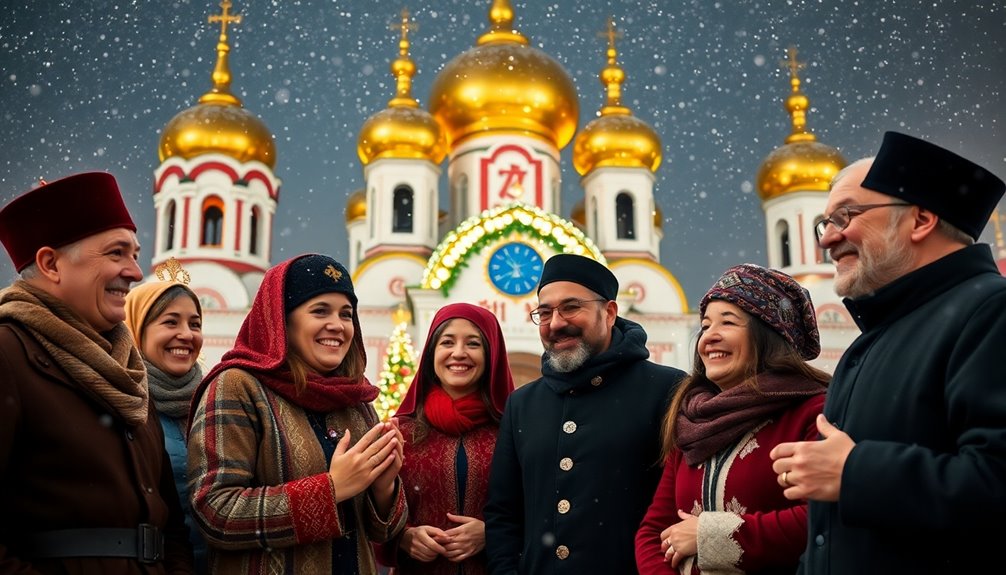
When you connect with Orthodox friends during the holiday season, you'll likely hear "Merry Christmas" as a common greeting.
However, you'll also notice cultural variations and context-driven phrases like "Happy Holidays" that promote inclusivity in mixed gatherings.
Understanding these greetings can enhance your interactions and celebrate the rich traditions of the Orthodox community.
Traditional Holiday Expressions
Orthodox Christians have a rich tapestry of holiday greetings that reflect their deep religious beliefs and cultural traditions. During Christmas, you'll often hear "Christ is Born!" followed by the joyful response "Glorify Him!" This exchange highlights the religious significance of the holiday.
While "Merry Christmas" is recognized, especially in English-speaking contexts, traditional expressions hold strong in many Orthodox cultures. These greetings resonate with the festive spirit, focusing on joy, family, and community.
The cultural diversity within Orthodoxy means that holiday customs can vary widely, showcasing unique local traditions. Embracing these greetings enriches your understanding of the holiday, allowing you to connect more deeply with the Orthodox Christian community during this special season.
Cultural Greeting Variations
As you explore the rich traditions of Orthodox holiday greetings, you'll find a fascinating array of expressions that vary by culture and region.
Orthodox Christians often greet one another with "Christ is born!" followed by the joyful response, "Glorify Him!" In places like Russia and Ukraine, some may use "Merry Christmas" when speaking to non-Orthodox individuals.
Additionally, "Happy Holidays" serves as an inclusive greeting that acknowledges the broader festive season. In Serbian-speaking areas, you might hear "Sretan Božić," translating to "Happy Christmas."
These cultural variations reflect the importance of community and family, as Orthodox individuals share warm wishes during holiday celebrations, emphasizing togetherness no matter the specific phrases used.
Contextual Greeting Considerations
Whether you're part of the Orthodox community or simply sharing in the joy of the season, understanding common holiday greetings can enhance your interactions.
Orthodox Christians celebrate Christmas on January 7, leading to unique contextual greetings. Here are some you might encounter:
- "Merry Christmas" or its local equivalents, reflecting cultural context
- "Happy New Year," commonly exchanged after Christmas celebrations
- "Happy Holidays," an inclusive greeting for diverse celebrations
- Regional variations, influenced by specific customs and traditions
- Warm wishes for the festive season, promoting goodwill
The Significance of Intent
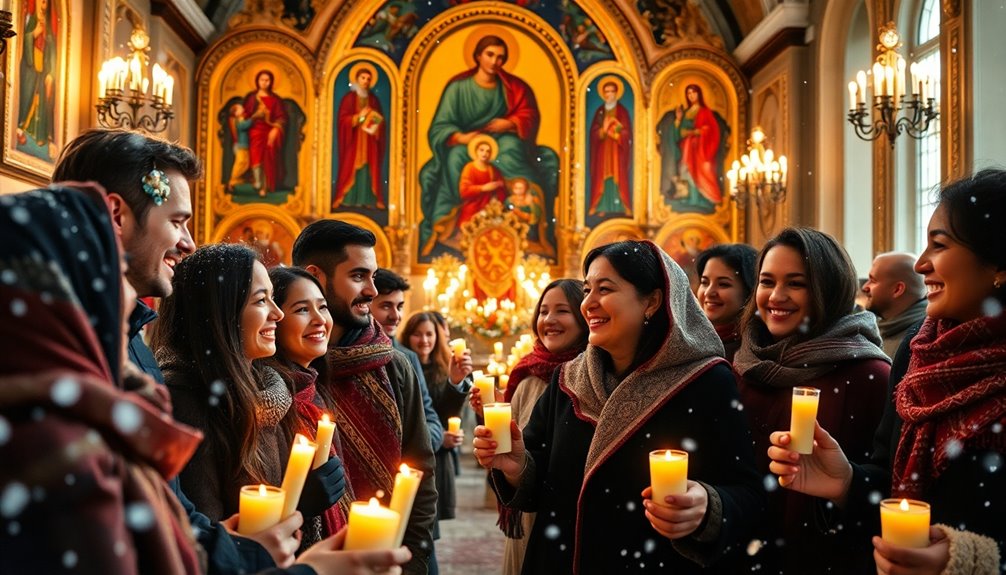
Understanding the significance of intent can greatly influence how you navigate holiday greetings within Orthodox circles. The concept of "kavana," or intention, plays an essential role in how Orthodox individuals perceive holiday greetings.
When you approach social interactions, consider whether your intention reflects sincere greetings or merely casual ones. If you lack malicious intent, using phrases like "Merry Christmas" might be more acceptable, depending on the context.
Additionally, the relationship you have with the recipient can shape how your greeting is received. By being mindful of your intentions, you can foster positive interactions while respecting the values and beliefs of Orthodox individuals.
This awareness can ultimately enhance your holiday experiences and strengthen your connections.
Cultural Sensitivity in Greetings
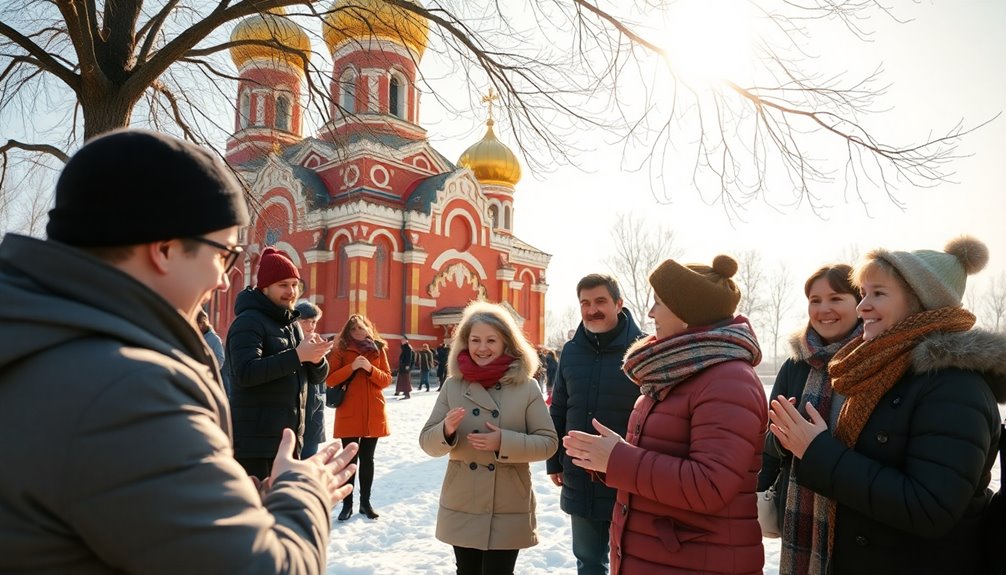
Cultural sensitivity in greetings matters, especially during the Orthodox holiday season. As you navigate this time, remember that Orthodox Christians celebrate Christmas on January 7, which may influence their preferred holiday greetings.
Using culturally sensitive alternatives can foster respect and understanding among diverse beliefs. Consider these points when choosing your words:
- "Merry Christmas" is often used, but not universally.
- Neutral terms like "Happy Holidays" can accommodate various traditions.
- Acknowledge that not everyone celebrates Christmas.
- Good manners and respect enhance your greetings.
- Awareness of the recipient's background guides your choices.
Historical Context of Christmas
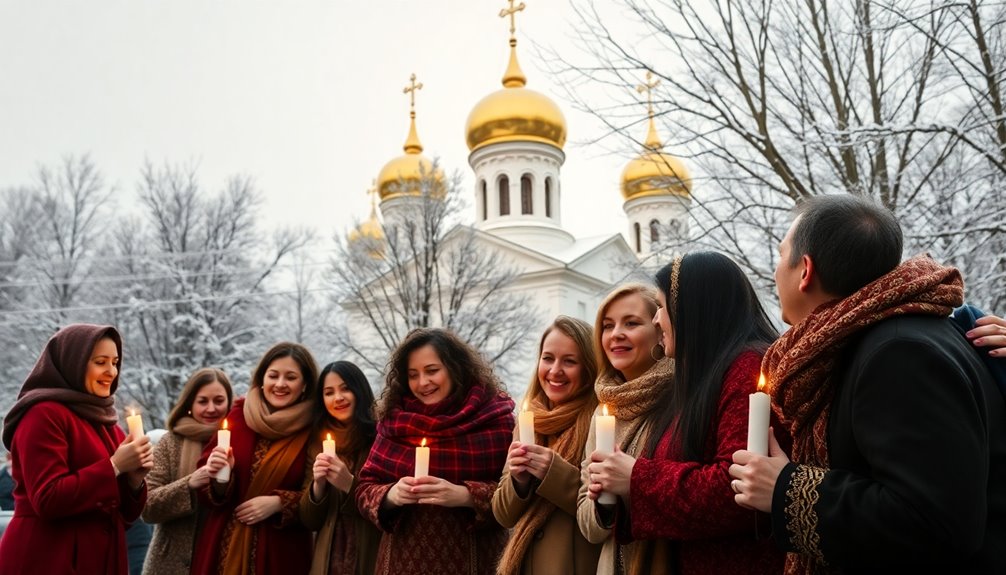
As Christmas evolved into a widely celebrated holiday, its historical roots intertwine with both religious and pagan traditions. Established in the 3rd and 4th centuries CE, the Church chose December 25 to align with existing pagan celebrations, countering skepticism about Jesus' existence.
In contrast, Orthodox Christians celebrate Christmas on January 7, corresponding to December 25 in the Julian calendar, leading to unique traditions and observances.
Meanwhile, the Puritans in America sought to outlaw Christmas, viewing its revelry as unholy.
The phrase "Merry Christmas" originally carried connotations of boisterous behavior, evolving over time to suggest drunkenness and lewdness by the late 1500s in England.
Understanding these historical contexts enriches your appreciation of Christmas greetings today.
Navigating Mixed Environments
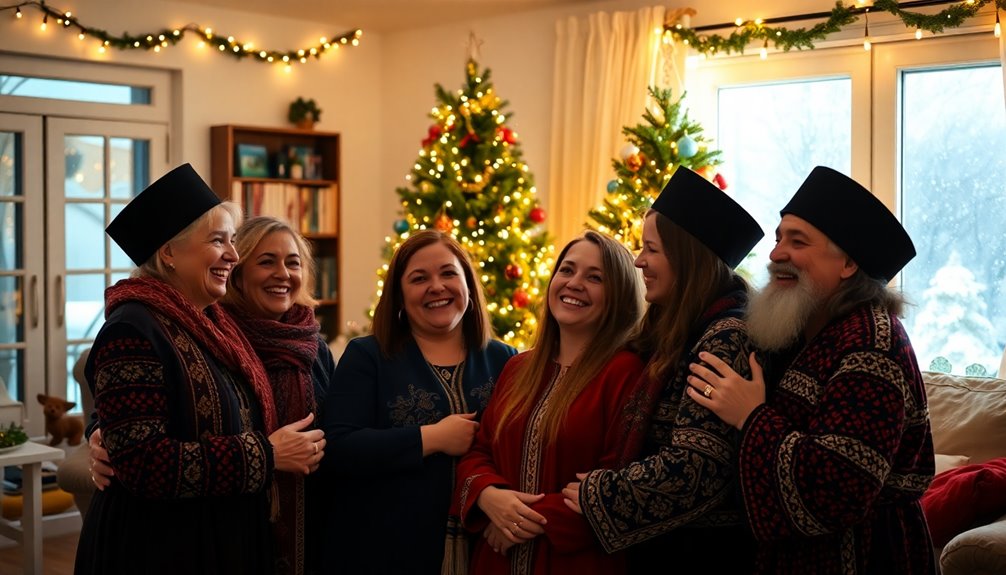
Celebrating Christmas in mixed environments can present unique challenges for Orthodox Christians. You might find yourself steering through various greeting choices during the holiday season.
Here are some tips to reflect on:
- Use "Happy Holidays" to acknowledge diverse celebrations.
- Opt for "Christ is Born!" to express your faith respectfully.
- Be aware of your audience's religious practices for appropriate greetings.
- Combine "Merry Christmas" with "Happy New Year" when in mixed company.
- Embrace flexibility in your expressions to promote inclusivity.
Understanding the cultural context of these greetings helps foster respect and goodwill.
Personal Experiences and Perspectives
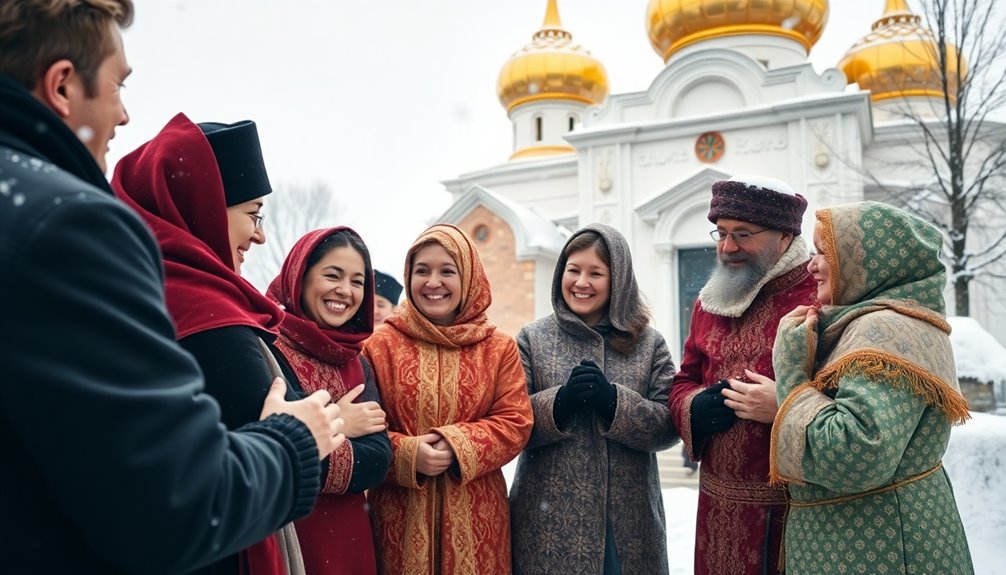
While maneuvering holiday greetings, many Orthodox Christians find that their personal experiences shape how they express their faith during this time. In church communities, traditional greetings like "Christ is born!" resonate deeply, emphasizing the holiday's religious significance. However, in secular contexts, you might find yourself saying "Merry Christmas" to friends or family who don't share the same beliefs. This blend showcases the diversity within Orthodox practices.
| Context | Greeting |
|---|---|
| Church Community | Christ is born! |
| Secular Context | Merry Christmas |
| Mixed Company | Happy Holidays |
Many Orthodox individuals prefer to avoid commercialism, opting instead for greetings that reflect their faith's core values.
Frequently Asked Questions
How Do Orthodox Christians Say "Merry Christmas"?
Orthodox Christians typically express "Merry Christmas" by saying "Christ is born!" in their native language, often followed by the response "Glorify Him!" This greeting highlights the holiday's spiritual significance.
In places like Russia, you might hear "S Rozhdestvom!" which translates to "Happy Christmas."
While you can use "Merry Christmas," many prefer greetings that resonate with their traditions and liturgical calendar, making your message feel more meaningful and heartfelt.
What Words Do Orthodox Say on Christmas?
When you celebrate Christmas, nothing compares to the joy of saying "Christ is born!" in your native tongue.
It's like shouting from the rooftops about the miracle of His birth! In response, you'll hear "Glorify Him!" echoing back, creating a sense of unity among believers.
Depending on where you are, you might add local customs and wishes, but the heart remains the same: honoring the birth of Christ with love and community.
How Do You Wish Someone an Orthodox Christmas?
To wish someone an Orthodox Christmas, you can say "Christ is Born!" and follow it with "Glorify Him!"
This greeting captures the essence of the celebration. If you're in a community where it's common, it's nice to add local traditions or phrases.
You might also say "Merry Christmas," but remember to embrace those traditional expressions to show respect for the holiday's significance.
Enjoy the warmth and joy of this special time!
What Is the Greeting for Greek Orthodox Christmas?
Wishing someone a Greek Orthodox Christmas is like wrapping them in a warm, festive blanket.
You'll want to use the traditional greeting "Kala Christougenna," which means "Good Christmas." It's a heartfelt way to share the joy of the season.
As you celebrate, don't forget to follow up with "Chronia Polla," meaning "Many Years," to wish them well in the coming year.
Embrace the spirit of the holiday with these warm words!
Conclusion
As the twinkling lights adorn the pine trees and the scent of fresh-baked pastries fills the air, remember that holiday greetings can bridge hearts and traditions. Whether you say "Merry Christmas" or share a heartfelt "Christ is Born," the warmth of your intent shines through. Embrace the beauty of diverse celebrations, allowing laughter and love to weave a tapestry of connection. In this season of joy, let your words reflect the spirit of unity that binds us all.
